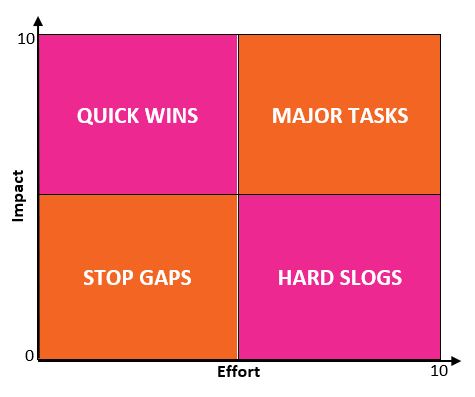Here we take you on a journey through time (management) and explore some advice that might help you balance between life, study and other potential demands on your time. Before you read on, why not take a look at these easy time management tips and reflect on which of these you do at the moment and where you could do more.
Making time
 There is no getting away from the fact that life can be very busy and there is lots to juggle. The Open University Time Planner can help you work out exactly how you can fit studying around other commitments. Using a planner helps you schedule each event, appointment and task so you don't run out of time. You can use it to set deadlines to help you stay on track and plan in extra time for yourself and spending time with your loved ones.
There is no getting away from the fact that life can be very busy and there is lots to juggle. The Open University Time Planner can help you work out exactly how you can fit studying around other commitments. Using a planner helps you schedule each event, appointment and task so you don't run out of time. You can use it to set deadlines to help you stay on track and plan in extra time for yourself and spending time with your loved ones.
For further, extensive advice, The Open University provides plenty of information on finding time to study. Remember, this advice can be used for all aspects of life. Whether you listen to a podcast linked to your studies on your commute, read while eating breakfast, or use your lunch break to make those ‘life admin’ phone calls, or take time for yourself, using your spare time is fundamental to good time management and positive wellbeing.
Thivashni, Masters in Education at The Open University in Inclusive Practice, says:
I usually make portable notes ie: mp3 audio notes of the extensive reading I have to do so I can listen to them anytime even when doing chores or travelling. I listen to my notes when dressing and cooking etc., so I am engaging with material often. I work full time as a teacher so time is very short for me and the day needs doubling up.
Staying organised and knowing how to prioritise
The phrase ‘clean house, clear mind’ makes no secret that having an organised environment around you can help you manage your levels of stress. Thanks to Marie Kondo’s Netflix series, encouraging us to ‘spark joy’ while tidying our homes, a nod has been made towards the wellbeing benefits of an organised space.
Putting this into a practice and organising other, less physical, elements of your life may help with managing your time and competing priorities, further supporting your wellbeing.
There is a lot of advice in all corners of the internet on how to be more organised at work which can be applied to managing study. Dr Robert Leahy discusses how breaking down actions and concentrating on specifics, rather than looking at large daunting tasks, can help with stress and manage workload.
This theory can be applied by starting with the simplest form of organisation: The To-Do list. In a world where technology is always at our fingertips free apps such as Trello and Remember the Milk, or paid apps such as Evernote, can aid the management of our to-do lists and prioritise tasks.
A combination of a To-Do list and considering the impact of each task can enhance your time management skills a step further by creating a: Action Priority Matrix. Try scoring each task on your To-Do list out of 10 on two scales. Firstly, score the task on the impact the activity will have on your overall goals. Secondly, on the effort involved in completing it. Using the template below you can plot each activity on the matrix using these scores. You can quickly see the tasks that give you the greatest returns on your efforts and identify where to prioritise your time.

When thinking about balancing all components of life, including work, study and personal commitments, it is also worth considering the emotional impacts that influence a task’s overall significance. To really challenge your approach to prioritisation and the strategies you use to manage your time, watch Rory Vaden as he discusses ‘How to multiply time’.
Everyday life hacks to save time
It was previously mentioned that you could use your mealtimes for extra study. This is only easy if your meals are ready to eat and you don’t need to use time to make meals for yourself, and maybe others in your family. Time saving life hacks, such as meal prepping, can feel daunting at first but it doesn’t have to be difficult. You can make double the dinner the night before and have leftovers for lunch. Here’s some recipes for batch cooking inspiration, many of which are freezer friendly. You could also set an hour aside every weekend to meal prep. Tasty provide ‘the only meal prep guide you need’.
This may feel like a big task, but it will save you time later in the week. If you watched Rory Vaden’s video this is a perfect example of “Return on Time Invested”. For example, with lunch prepared you could book that appointment you have been meaning to make for weeks or maybe finish that chapter you need to read for an assignment.
It’s worth noting that meal preparation is most successful when combined with a ‘weekly shop’, which can also help you budget. Writing a shopping list and using leftovers are both tips on the NHS guidance on how to eat well on a budget but these tips will also help you with staying more organised.
Procrastination, burnout and self-care
Everyone puts things off, or as we have already discussed, prioritises other items first, in turn delaying something else. Procrastinators can avoid difficult tasks and deliberately look for distractions which can severely inhibit their time management. If you find yourself saying yes to these statements, you might be a procrastinator:
- You often find yourself doing tasks that you meant to do days before.
- You find jobs don’t get done even when there is little remaining to complete.
- You delay making decisions, even when you have all the information you need.
- When you have something difficult to do you wait to complete it and tell yourself you will do it when you feel ‘more inspired’.
- You often rush to complete tasks on time.
Procrastination is tempting but can be harmful. If you have recognised a tendency to procrastinate within yourself, try and figure out why this might be. If may be that you are scared to fail, perfectionism is a trait often found in chronic procrastinators. Once you know why you procrastinate you can plan to get out of this habit. Advice on procrastination and how to tackle it is readily available online, plus watch the Med School Insiders video below on seven steps to help with procrastination.
Graham, an OU student says:
I think it is important to take one day off to refresh the mind. I know that you may feel you cannot afford to do it but you do need some downtime. Go for a run, take time to look at the world around you, it is worth taking the time out.
Feeling as though you ‘don’t want to’ or ‘just cannot’ do something may appear as procrastination but may indicate the first stages of Burn Out. Depending on the severity of burnout there is a variety of advice on combating symptoms but in the initial phases the importance of self-care is often highlighted.
It’s important to take time for yourself while studying, however you might choose to do this. Try following Mind’s tips on self-care or read Rachel’s experience on discovering self-care while balancing life and study on the Mental Health Foundation website. You can also read about wellbeing strategies which may support your self-care routine.
If you need further support and advice regarding your mental health, including stress around your studies or Burn Out, you can get information from support for you and your mental health.
Acknowledgements
This article was written by The Open University in Wales in partnership with Wrexham Glyndŵr University, Addysg Oedolion Cymru Adult Learners Wales and the Open University Students’ Association. Much of the content in this article was incorporated using feedback from a survey of Welsh part-time and Higher Education students in 2020. Links are directly embedded throughout the article to take to other useful resources but in some cases information and advice has been sourced and repurposed from the following organisations: National Health Service (NHS), The Open University and Psychology Today.
This resource is part of the 'Wellbeing and Mental Health Collection' created by the Open University in Wales. You can learn more and find courses, articles and other activities on the collection's homepage.






Rate and Review
Rate this article
Review this article
Log into OpenLearn to leave reviews and join in the conversation.
Article reviews